
Greece ranks last among Eurozone member states in the purchasing power of wages, which measures the average full time adjusted salary in Purchasing Power Standards (PPS), placing it behind Bulgaria, with Greece’s GDP per capita at 68% of the EU average and the average full-time wage even lower at 54% of the EU average.
The “adjusted” wage accounts for both salary levels and working hours per country, converting part-time wages into full-time equivalents. This approach was adopted as part-time work becomes more prevalent in the EU, aiming for a more representative indicator than simple wage averages.
Eurostat’s Methodology
Since 2021, with the adoption of the Blue Card directive, Eurostat has started calculating the “average annual adjusted full-time wage per worker.” This metric serves as an “entry threshold” for countries to grant work permits to highly skilled workers from third countries, representing “a wage sufficient for a decent living in each member state.”
Greece’s Position in Wage Rankings
Greece ranks third from the bottom for the nominal average annual adjusted full-time wage at €17,013 per year, closely followed by Hungary at €16,895. Bulgaria has the lowest with €13,503. The EU average stands at €37,863.
However, when these wages are adjusted for purchasing power, the landscape changes:
The Purchasing Power Parity (PPP) metric adjustments account for the cost of living differences across Europe, especially in housing costs. PPP aims to “eliminate the impact of price differentials between countries.” 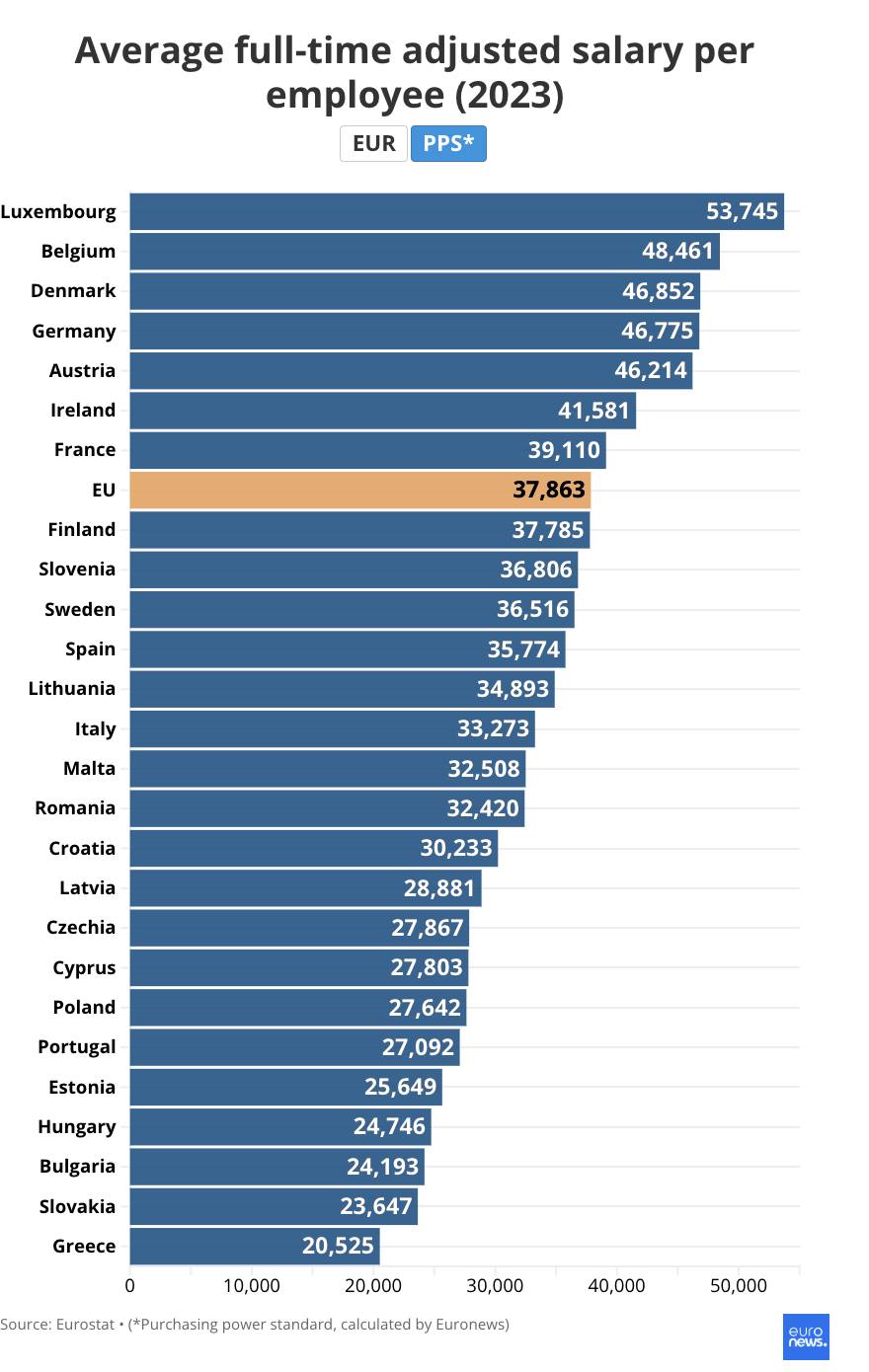
The purchasing power standard is an artificial currency unit. Theoretically, one PPS can buy the same amount of goods and services in each country. However, price differences across borders mean that different amounts of national currency units are needed for the same goods and services depending on the country. PPS are derived by dividing any economic aggregate of a country in national currency by its respective purchasing power parities.
In nominal terms, the highest average wage was six times that of the lowest, but this ratio drops to 2.5 times when adjusted by PPS.
Country Comparisons:
Greece’s wage in PPS terms is the lowest, at 20,525, compared to the EU average of 37,863 PPS.
Only seven countries surpassed the EU average in PPS terms, including Luxembourg, Belgium, Denmark, Germany, and Austria, with wages over 45,000 PPS. Ireland and France also exceeded the average at 41,581 and 39,110 PPS, respectively.
Among the EU’s major economies, Italy had the lowest PPS wage at 33,723, while Spain was slightly higher at 35,774 PPS, both below the EU average. 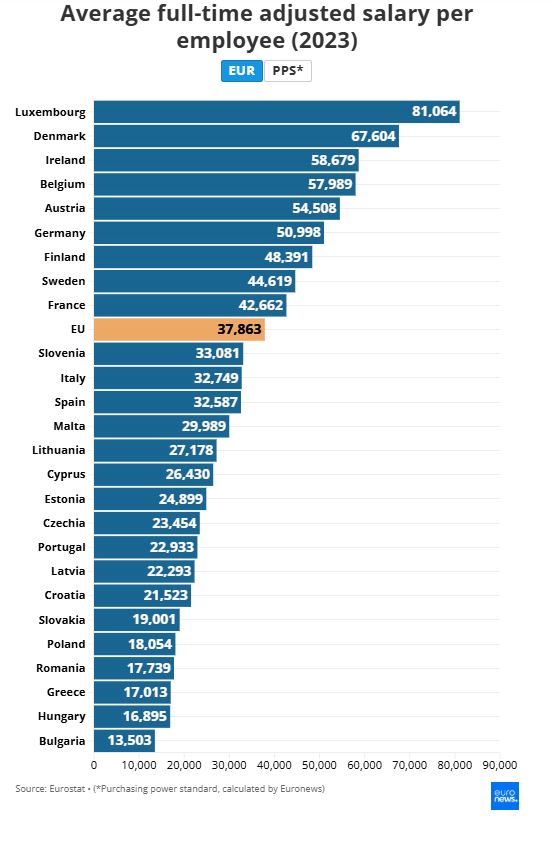
Factors such as high unemployment, lower productivity, and economic recovery post-crisis are believed to contribute to Greece’s low ranking in purchasing power of wages, although these factors are inconclusive.
Northern and Western Europe are consistently in the lead regarding average salary earnings. However, their advantage diminishes when rankings are adjusted for Purchasing Power Standards (PPS).
In eastern European countries, while there is slight improvement in PPS rankings, average salaries remain significantly below the EU average, highlighting persistent disparities.
In southern Europe, countries continue to face challenges on both fronts, grappling with low wages and limited purchasing power, underscoring economic difficulties.
Source: Tovima.com
Latest News

Airbnb Greece – Initial CoS Ruling Deems Tax Circular Unlawful
The case reached the Council of State following annulment applications filed by the Panhellenic Federation of Property Owners (POMIDA)

Mitsotakis Unveils €1 Billion Plan for Housing, Pensioners, Public investments
Greek Prime Minister Kyriakos Mitsotakis has announced a new set of economic support measures, worth 1 billion euros, aiming to provide financial relief to citizens.

Alter Ego Ventures Invests in Pioneering Gaming Company ‘Couch Heroes’
Alter Ego Ventures' participation in the share capital of Couch Heroes marks yet another investment by the Alter Ego Media Group in innovative companies with a focus on technology.

Corruption Still Plagues Greece’s Driving Tests
While traffic accidents continue to claim lives on Greek roads daily, irregularities and under-the-table dealings in the training and testing of new drivers remain disturbingly widespread

Pope Francis Died of Stroke and Heart Failure Vatican Confirms
As news of the official cause of death spread, tributes poured in from across the globe. The 1.4 billion-member Catholic Church is united in grief, remembering a pope who championed inclusion, justice, and compassion

Increase in Both Museum Visits, Revenues for 2024
As expected, the Acropolis was the top archeological site in the country, followed by Sounion, Mycenae, the ancient theater of Epidaurus, and Vergina in northern Greece

Where Greece’s Tourists Come From: A Look at 2025’s Top Visitor Markets
The United Kingdom continues to hold the top spot as the largest source of incoming tourism, with 5.6 million seats booked for Greece this summer — up 2.2% from last year. This accounts for 20% of all international air traffic to Greece

Pope Francis: A Pontiff Who Reshaped the Papacy and Sparked a Global Conversation
His first words from the balcony of St. Peter’s Basilica—“Brothers and sisters, good evening”—set the tone for a pontificate that would challenge norms, favor mercy over dogma, and bring the papacy closer to the people.

When Blue Skies was Unmasked as ND’s Political ‘Slush Fund’
The fact that so many top New Democracy (ND) party cadres were paid by the firm Blue Skies, owned by Thomas Varvitsiotis and Yiannis Olympios, without ever citing this publicly, raises very serious moral issues, regardless of the legality

Greek Women’s Water Polo Team Top in the World after 13-9 Win Over Hungary
The Greek team had previously defeated another tournament favorite, the Netherlands, to reach the final.











![Πλημμύρες: Σημειώθηκαν σε επίπεδα ρεκόρ στην Ευρώπη το 2024 [γράφημα]](https://www.ot.gr/wp-content/uploads/2025/04/FLOOD_HUNGRY-90x90.jpg)




![Ξενοδοχεία: Μεγάλο το ενδιαφέρον για επενδύσεις στην Ελλάδα – Η θέση της Αθήνας [γραφήματα]](https://www.ot.gr/wp-content/uploads/2025/03/Athens-hotels-90x90.jpg)









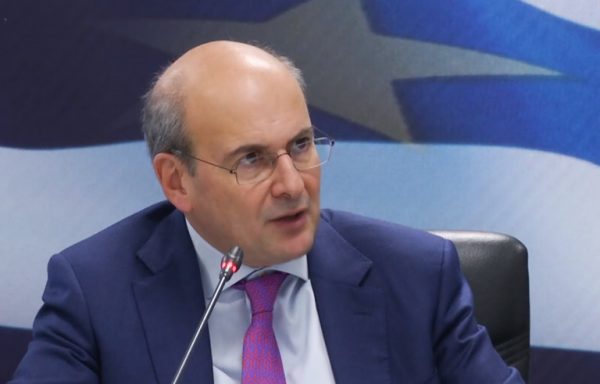
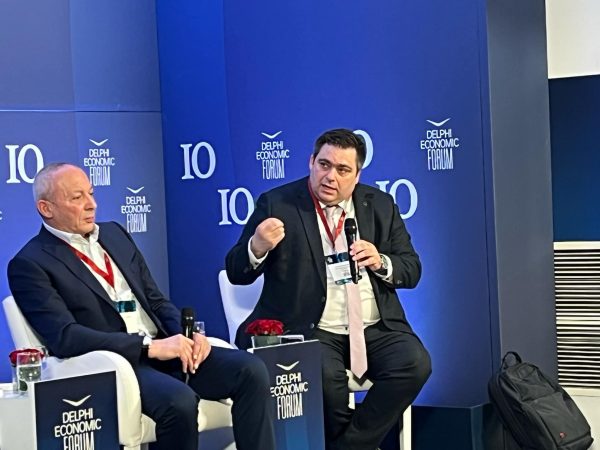








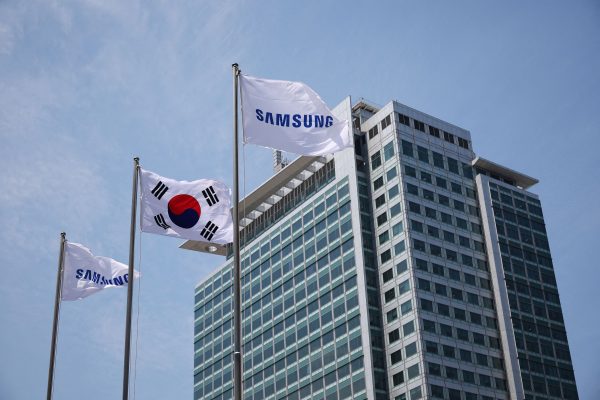




 Αριθμός Πιστοποίησης
Αριθμός Πιστοποίησης